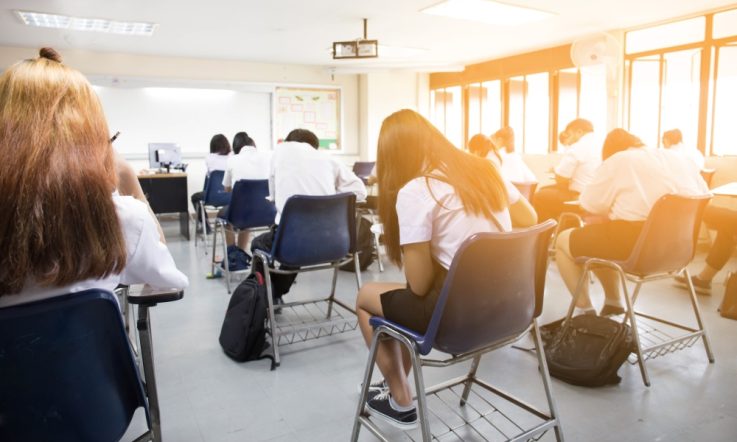This podcast from Teacher is supported by Teachers Mutual Bank, the only Australian bank built and owned by teachers.
Thanks for tuning in to this episode of Teacher Staffroom, where we catch you up on the latest evidence, insight, and action in education. I'm Dominique Russell.
We’re coming to the end of term 2 in Australia and as you look towards the second half of 2024, you might be starting to turn your eyes towards things like the pathways for senior secondary students when they leave school, seeking feedback from staff as a school leader, and, of course, your own tax return as we come to the end of the financial year. We’ve spoken about all of these topics this month at Teacher to provide you with practical and useful information, and also to promote reflection amongst yourselves and your colleagues by sharing the approach of some schools around the country. So, in this episode of Teacher Staffroom I’ll be bringing you up to speed on this content.
And don’t forget, like all episodes of Teacher Staffroom, I’ll also be posing some questions throughout this podcast, so feel free to pause the audio as you go, gather some colleagues, and discuss together how these stories might be relevant to your school context. Let's jump in.
This month, nominations opened for the 2024 Teacher Awards. We’re in the second year now of Teacher Awards and they recognise outstanding approaches to teaching and school leadership across 8 categories. All educators and staff working in the K-12 area in Australia are welcome to enter and you have until Monday 22 July to get your nomination in.
You can find all the information you’ll need at teachermagazine.com/teacherawards. Now, though, I’d like to highlight 2 of our 8 Awards categories with you. The first one that I’d like to shine the spotlight on is the Improving Student Learning and Progress Award. This award is open to an individual or a team of educators and it celebrates success in improving learning and progress for students, regardless of their starting point – including those working above or below year-level expectations. Judges will be looking for elements like: the systematic collection and use of data, from different sources, to identify where individuals are at in their learning; the communication of student progress and long-term growth; and a feedback and reporting approach which aligns with the school context. Last year, Catherine Young from Newman College in WA was named winner of this award for her role in enhancing data literacy skills and supporting her colleagues in this area.
The other award I wanted to give a shoutout to is the Excellence in Staff Collaboration Award. This one is open to teams of leaders and teachers who are working together to improve their practice and lift student outcomes. For this award, our judges will be looking for elements such as evidence of a culture of collaboration and teamwork within the school; examples of staff working with other schools; and school leaders providing regular opportunities for teachers to learn from each other’s practice. Last year, it was the team at Goondiwindi State High School in Queensland that were named winners of this award.
An article on both of these winners sharing the details of their stories is available to read at our website, teachermagazine.com. And, of course, I should mention if you’re interested in nominating yourself, a colleague, or a team of colleagues for one of our 8 Awards, it’s not essential that you meet each element of the award criteria – the award description is just there to help guide your thinking and offer some suggestions for practices that are relevant to the award.
Now, staying on the topic of staff collaboration for the moment, I’d like to share with you a really interesting conversation Teacher editor Jo Earp had with our guest for School Assembly Series 2, Jo Camozzato. We’re up to Episode 10 now in the series and in this latest episode, we hear about how Jo is fostering a sense of staff collaboration with her staff at this brand-new school. As I mentioned before on the Excellence in Staff Collaboration Award, setting aside time for collaboration is likely a key part of maintaining this culture. Jo explained exactly how she is doing this in her school in the episode – here’s a snippet of what she had to say:
… I've pushed a lot of face-to-face meetings because when you don't know each other, I think it is important to be able to read the room, read people's body language, see how the meeting is going or how the, you know, the planning is going if it's a planning meeting. But at the same time, we have to be practical, and if practical means everyone can get online for a short 30-minute collaborative discussion and look at a document altogether online, then that's a good way to go. You've got to be flexible in that manner. I keep it going also by mixing things up in our official meetings. So, you might remember I said that staff just don't get to sit wherever they want to sit in the staff offices, I sort of strategically mix people up. And the same thing happens at meetings after school. It's like a wedding party. I always have a look at who should sit with who so that we are constantly, you know, making sure people have a chance to speak to each other and find out more about what's going on. It's not just about sitting with your bestie all the time. It's very, very deliberate what we do.
I really liked hearing about how Jo approaches staff seating plans. We talk a lot about classroom layouts for students, but it was great to hear about the importance of staff seating from a leadership perspective.
In this episode, Jo also spoke about the importance of collecting staff feedback, which was also really interesting to hear about, and she spoke about how she uses short surveys to check in with the school community on various practices in the school. So, that brings me to a question for you to think about. As a school leader, how frequently are you utilising surveys to receive feedback from staff, students and families? Are you using results from surveys to inform your next steps? How are you communicating the value of feedback to your school community?
After the break, I’ll bring you a story on successful school and university partnerships, and we’ll chat about an accountant’s best tips for teachers at tax time this year. But first, here’s a quick message from our sponsor.
Just like there’s more to teachers than teaching, there’s more to banks than just banking. At Teachers Mutual Bank, they reinvest profits to benefit members, through online resources, offering scholarships and building partnerships that reward teachers just like you. They know that teachers need a different kind of bank. Visit tmbank.com.au. Membership criteria apply. Teachers Mutual Bank Limited AFSL238981.
For the latest episode in our Research Files series I had the pleasure of speaking with Simon Leonard from the University of South Australia and Lesley Johnson from Trinity College in Adelaide about their partnership that’s been ongoing since 2017. An obvious benefit of the partnership was the fact that many students from Trinity College graduate and then choose to enrol in higher education degrees at the University of South Australia, so the school and the university were really keen to have a partnership in place to better understand the student journey and how they can better meet student needs. I also asked them about why entering a partnership of this kind was of interest to both the school and the university outside of these students and also about how it’s improving staff and student outcomes on both sides. They both also shared some fascinating insights on the keys to the partnership’s long-term success, and also the challenges they’ve overcome along the way.
One element of the conversation I’d like to highlight with you here, though, is where Simon discussed the importance of short-term benefits for staff, for the overall success of the partnership. Here he is:
Some other things that I think we've done well on both sides of the partnership is to make sure that there is tangible short-term benefit for the staff that get involved. And I think that is, you know, for all we have talked about, it's flexible and it's long term (and the leadership has really engaged at that level) but for busy teachers, for busy teaching and research staff in a university, trying to find the time to invest in what we do in this partnership can be hard. You sit there and go, ‘at the end of the day do I want to go and talk to that person from the university, that person from the school?’, and it can easily get bumped down your priority list.
So, we’ve done things like, on the school side, Lesley was talking about cohorts of a Professional Certificate. So we've structured some of the way that we're related and some of the way that we build small projects and some of the way that we do that, just the opportunity to have conversation; we’ve structured that as formal professional development so that the teachers have been able to put the time of the relationship into the teacher PD column and meet those requirements for their registration and so on, or just for their career advancement. And we've done that in structures that do provide pathways into higher learning in the university. So, there are credit transfer pathways into our Master of Education, or it provides a pathway towards a PhD, say. So, there's that kind of tangible activity on that side.
So, that brings me to a question for you to reflect on. Think about a voluntary staff working group in your school. Are participants afforded tangible, short-term benefits through this group? If not, how could you incorporate this?
And finally, if you’re listening to this episode as soon as it becomes available, the financial year ends in just a couple of days. To help you with your returns this year, we spoke with the Director of Tax Communications at H&R Block, Mark Chapman.
He shared some really interesting tips with us – for example, did you know that you can claim working from home expenses if you’re doing some marking or preparing for lessons at home? Or, that you can also claim deductions for the work-related proportion of any personal costs incurred for excursions, school trips or camps you’ve been obliged to go on?
He even let us know the impact things like spelling errors can have on processing times. So, as you can probably tell, Mark shared a whole range of tips in this Q&A, so I really recommend you read the full piece at our website – you can find it by searching ‘tax 2024’.
That's all for this episode. Thanks for listening. You’re now all caught up on the latest evidence, insight and action. I’ll leave all the links to the full articles and podcast episodes I mentioned today in the transcript of this podcast episode, which you can find under the podcast tab at our website, www.teachermagazine.com.
You've been listening to a podcast from Teacher, supported by Teachers Mutual Bank, the only Australian bank built and owned by teachers.



